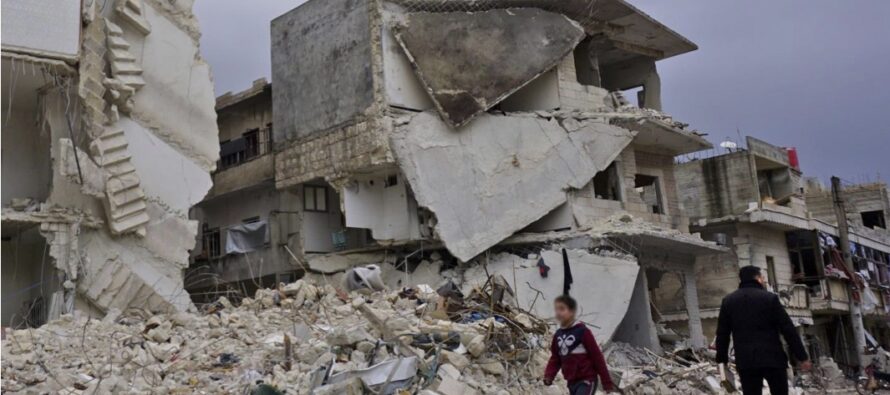Turkey: Syrians illegally deported into war before ‘safe zone’ is created

![]()
Amnesty International claims Turkey spent the months leading up to its military incursion into northeast Syria forcibly deporting refugees to the war-torn country, in advance of attempting to create a so-called “safe zone” on the Syrian side of the border.
A new Amnesty International report ‘Sent to a War Zone: Turkey’s Illegal Deportations Of Syrian Refugees’ confirmed that in fact Turkey has been deporting Syrian refugees to the war zone, months before its offensive began.
The organization met or spoke with refugees who said Turkish police had beaten or threatened them into signing documents stating they were asking to return to Syria, when in reality Turkey was forcing them back to a war zone and putting their lives in grave danger.
“Turkey’s claim that refugees from Syria are choosing to walk straight back into the conflict is dangerous and dishonest. Rather, our research shows that people are being tricked or forced into returning,” said Anna Shea, Researcher on Refugee and Migrant Rights at Amnesty International.
“Turkey deserves recognition for hosting more than 3.6 million women, men and children from Syria for over eight years, but it cannot use this generosity as an excuse to flout international and domestic law by deporting people to an active conflict zone.”
Without official statistics, estimating the number of forced deportations is difficult. But based on dozens of interviews conducted between July and October 2019 for the report, ‘Sent to a war zone: Turkey’s illegal deportations of Syrian refugees’, Amnesty International estimates that over the past few months the figure is likely in the hundreds. The Turkish authorities claim that a total of 315,000 people have left for Syria on an entirely voluntary basis.
It is illegal to deport people to Syria as it exposes them to a real risk of serious human rights violations.
“It is chilling that Turkey’s deal with Russia this week agrees to the ‘safe and voluntary return’ of refugees to a yet to-be-established ‘safe zone.’ Returns until now have been anything but safe and voluntary – and now millions more refugees from Syria are at risk,” said Anna Shea.
Forced returns disguised as “voluntary”
The Turkish government claims that all those who return to Syria do so voluntarily, but Amnesty International’s research showed that many had been coerced or misled when signing so-called “voluntary return” documents.
Some said they were beaten or threatened with violence to force them to sign. Others were told they were signing a registration document, that it was a confirmation of having received a blanket from a detention centre, or a form that expressed their desire to remain in Turkey.
Amnesty International documented 20 verified cases of forced deportations, each of which involved people being sent across the border on buses filled with dozens of other people who were handcuffed with plastic ties and were also seemingly being forcibly deported.
Qasim*, a 39-year-old father from Aleppo, said he was detained in a Konya police station for six days, where the officers reportedly told him: “You have a choice: one or two months, or a year, in prison – or you go to Syria.”
John, a Syrian Christian, said Turkish migration officials told him: “If you ask for a lawyer we will keep you six or seven months and we will hurt you.”
He was deported after being caught by the Turkish coastguard trying to get to Greece, and said that after arriving in Syria he was detained for a week in Idlib by Jabhat al Nusra, an Islamist group linked to Al Qaeda.
“It was a miracle I got out alive,” he said.
Any interaction with Turkish police or migration officials appears to put refugees from Syria at risk of detention and deportation, such as attending an interview to renew valid documents, or being asked for identification on the street.
The most common explanation given to people for their deportation is that they are unregistered or outside their province of registration. However, even people with valid IDs for their province of residence have been deported.
The overwhelming majority of deportees appear to be adult men transported together on buses through Turkey’s Hatay province to the Bab al-Hawa border crossing in the Syrian province of Idlib.
However Kareem, a 23-year-old man from Aleppo, said he was deported from Istanbul with two children aged 15 and 16, who were unregistered. Their mothers pleaded with the authorities outside the bus while their children were inside, but military police reportedly said the boys were breaking the law because they had no IDs, and that they would therefore be deported.
Nabil, a young man with a wife and two-year-old son, told Amnesty International that he and his family were detained in Ankara in June 2019, alongside more than 100 other people. All the detainees were families except for three single men. Nabil said that after three days, they were told they were being taken to a camp in Hatay province, but instead they were all deported by bus to Idlib.
“The Turkish authorities must stop forcibly returning people to Syria and ensure that anyone who has been deported is able to re-enter Turkey safely and re-access essential services,” said Anna Shea.
“The European Union and the rest of the international community, instead of devoting their energies to keeping people seeking asylum from their territories, should dramatically increase resettlement commitments for Syrian refugees from Turkey.”
The report can be downloaded here
Related Articles
Il commissariamento e i complici – Fabrizio Tringali
![]()
Megachip. La BCE ha deciso di procedere all’acquisto di titoli del debito pubblico italiano e spagnolo.
Otro «accidente» antidemocrático de Turquía – GARA
![]()
El BDP kurdo calificó el ataque aéreo del Ejército turco, que provocó la muerte de 35 civiles,
Former PMs sign appeal for dialogue in Turkey
![]()
Arch. Desmond Tutu launched appeal and initiative for peace in Turkey with many former head of states Archbishop Emeritus Desmond


